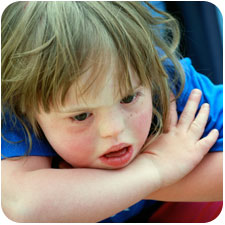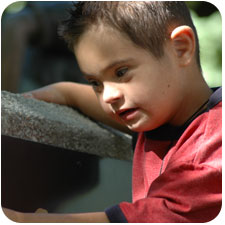
 |
|||||||
 |
 |
 |
 |
 |
 |
 |
 |

 One of the areas of parental concern for the development of any baby is the area of mobility. Watching a baby learn to crawl, creep, stand and walk are thrilling to all parents. As a parent we can see our child learn to better explore their world and move from dependence to independence sometimes in the time span of the first year.
One of the areas of parental concern for the development of any baby is the area of mobility. Watching a baby learn to crawl, creep, stand and walk are thrilling to all parents. As a parent we can see our child learn to better explore their world and move from dependence to independence sometimes in the time span of the first year.
As a parent of a DS child, you may have a special concern about your child's development of mobility. Cardiac conditions can slow down the emergence and development of mobility. The potential or reality of low muscle tone and poor tactility can also slow down development in this area drastically. Parents are often tempted to skip mobility developmental stages in an effort to reach the coveted skill of walking more rapidly. The consequences of this strategy can be very long lasting and impact other developmental areas as well.
 Children with Down syndrome are at a much higher risk for congenital heart disease. As a comparison: the incidence of congenital heart disease in the general population is 0.8 percent. The incidence of congenital heart disease in children with Down syndrome is between 40-60 percent.
Children with Down syndrome are at a much higher risk for congenital heart disease. As a comparison: the incidence of congenital heart disease in the general population is 0.8 percent. The incidence of congenital heart disease in children with Down syndrome is between 40-60 percent.
Some heart defects can be left alone with careful monitoring while others require surgery to correct the problem.
Parents of a child with Down syndrome need to work closely with their child's doctor(s) to determine what route (surgical or medical) will best serve their child.
 Apnea (meaning "without breath") is the term used when someone stops breathing for very short periods of time, usually 10 to 20 seconds. It's termed "obstructive" when respiratory efforts continue, such as movements of the chest. It's termed "central" when all respiratory effort stops. In children, sleep apnea is almost always obstructive. During the apneic episode, the child will have decreased oxygenation of the blood.
Apnea (meaning "without breath") is the term used when someone stops breathing for very short periods of time, usually 10 to 20 seconds. It's termed "obstructive" when respiratory efforts continue, such as movements of the chest. It's termed "central" when all respiratory effort stops. In children, sleep apnea is almost always obstructive. During the apneic episode, the child will have decreased oxygenation of the blood.
Sleep apnea in the general population is very common. Well over 18 million Americans suffer from sleep apnea and it is estimated that there are at least another 10 million that are undiagnosed. Over 2 million children suffer from sleep apnea. The majority of obstructions actually come from the tongue falling back into the throat and serving as the obstruction.
 Problems with the gastrointestinal tract can either be caused by abnormal structure or may be because part of the tract is not functioning properly. Children with Down syndrome are more likely to have problems in both of these areas than the general population. Some of these problems are serious and life threatening and are likely to cause immediate problems in a newborn. Other issues may not be as serious, but nevertheless can cause considerable problems. Sometimes, gastrointestinal problems may not be noticeable by parents or doctors because some issues develop more slowly.
Problems with the gastrointestinal tract can either be caused by abnormal structure or may be because part of the tract is not functioning properly. Children with Down syndrome are more likely to have problems in both of these areas than the general population. Some of these problems are serious and life threatening and are likely to cause immediate problems in a newborn. Other issues may not be as serious, but nevertheless can cause considerable problems. Sometimes, gastrointestinal problems may not be noticeable by parents or doctors because some issues develop more slowly.
Gastrointestinal problems are a common cause of illness in all children. The more common problems include gastroenteritis (an infection affecting the stomach and intestines) and appendicitis. Regarding typical stomach and digestive problems, children with Down syndrome are no different than typically developing children. However, if a child with Down syndrome seems to have more gastrointestinal problems it is important to have a medical assessment which should consider both the common conditions as well as those that tend to more often affect children with Down syndrome.
NACD 5492 S 500 E Washington Terrace, Utah 84405 | Phone: (801) 621-8606 Fax: (801) 621-8389
Copyright 1986–2017 The National Association for Child Development. All rights reserved.